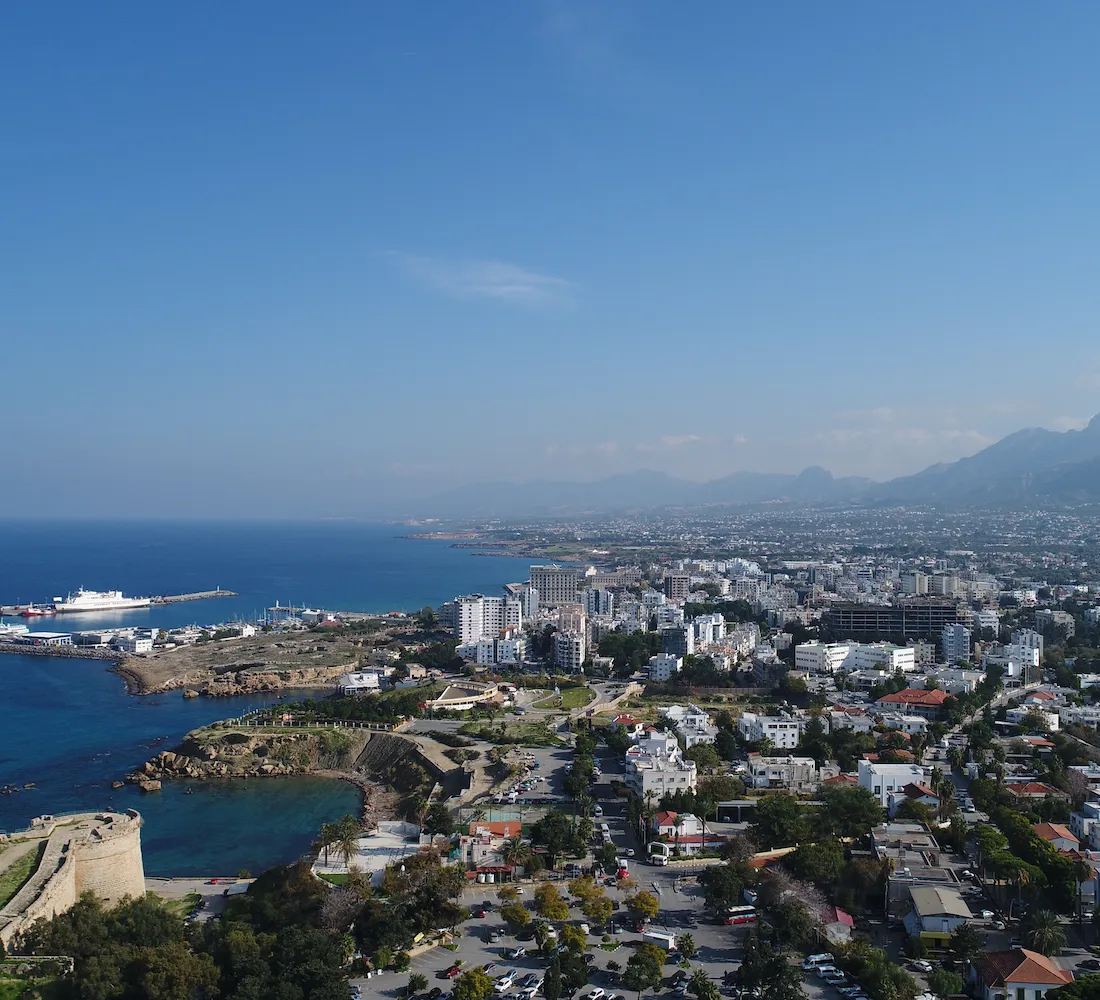Turkish Cyprus is considered one of the important destinations in the Mediterranean region, possessing a rich history and a strategic location that has attracted the interest of many civilizations throughout the ages. Since the island's division in 1974, the Turkish Republic of Northern Cyprus has become a de facto independent entity, contributing to the development of its own political and economic identity.
Today, Turkish Cyprus is an attractive environment for real estate and tourism investments, thanks to its unique location, moderate living costs, and diverse investment opportunities. With the development of infrastructure projects, the tourism sector, education, and real estate, the island has become an ideal destination for many foreign investors seeking to achieve lucrative profits in a stable environment.
In this article, presented by MBANY Real Estate, we will review the history of Turkish Cyprus, its most prominent investment projects, and the key features that make it a promising economic environment.
Overview of Turkish Cyprus
Turkish Cyprus is part of the island of Cyprus located in the Mediterranean Sea, where the Turkish Republic of Northern Cyprus constitutes the northern region of the island. Since its de facto declaration of independence in 1983, Turkish Cyprus has enjoyed independent administration despite not being widely recognized internationally, except by Turkey, which supports it politically and economically.
Turkish Cyprus has a promising economic environment, having witnessed growth in the real estate, tourism, and education sectors in recent years, making it an attractive investment destination. The island is characterized by its stunning nature and strategic location that connects Europe and the Middle East, granting it significant geopolitical importance.
Where is Turkish Cyprus Located?
Turkish Cyprus is located in the northern part of the island of Cyprus in the Mediterranean Sea, bordered to the south by the Greek Republic of Cyprus. The island is approximately 70 kilometers from the Turkish coast, making it geographically close to the Turkish mainland. It is surrounded by the sea on all sides, providing it with a distinguished location that qualifies it to be a commercial and tourist hub in the region.
The location of Turkish Cyprus features a mild Mediterranean climate, with hot and dry summers and mild, rainy winters, making it a preferred destination for both tourists and investors.
What is the Capital of Turkish Cyprus?
The capital of the Turkish Republic of Northern Cyprus is Northern Nicosia, which is the northern part of the divided city of Nicosia between the Turkish and Greek sectors. Northern Nicosia is the administrative, economic, and political center of Turkish Cyprus, housing many government institutions, universities, and commercial areas.
The capital is characterized by a unique cultural blend that reflects its Ottoman and British historical influences, along with its modern development that has made it a primary investment destination in the fields of education, real estate, and tourism.
Area and Population of Turkish Cyprus
The area of the Turkish Republic of Northern Cyprus is approximately 3,355 square kilometers, accounting for about 36% of the total area of the island of Cyprus. Despite its small size, it boasts diverse economic resources, particularly in the tourism, real estate, and education sectors.
The population of Turkish Cyprus is estimated to be around 400,000, with a continuous increase due to its appeal to foreign students and investors. Turkish Cypriots make up the vast majority of the population, in addition to foreign residents who come for work, study, or investment.
History and Geography: The Island of Turkish Cyprus
The island of Turkish Cyprus has a rich history that dates back thousands of years, having been home to many civilizations such as the Greeks, Phoenicians, Romans, and Byzantines, culminating in Ottoman rule in the sixteenth century. In 1878, the administration of the island was transferred to Britain, and Cyprus gained its independence in 1960. However, conflicts between Turkish Cypriots and Greek Cypriots led to the division of the island in 1974, with Turkish Cypriots settling in the north and Greek Cypriots in the south.
Today, the Turkish Republic of Northern Cyprus constitutes the northern part of the island and enjoys independent administration with support from Turkey. The geography of Cyprus is characterized by its natural diversity, featuring beautiful coastlines, green mountains, and fertile plains, making it a distinctive tourist and investment destination.
The Border Between Turkish and Greek Cyprus
The border between Turkish and Greek Cyprus divides the island into two main sections, separated by the "Green Line," a buffer zone managed by the United Nations since 1974. This line runs through the capital Nicosia, making it the last divided capital in the world.
Despite political tensions, there are several open border crossings between the north and south, facilitating movement between the two areas for tourism, trade, and family visits. Many investors seek to take advantage of this strategic location, especially in the real estate and tourism sectors.
Currency of Turkish Cyprus
The Turkish Republic of Northern Cyprus uses the Turkish lira (TRY) as its official currency, due to its close ties with Turkey. However, the euro, British pound, and US dollar are also accepted in many tourist and commercial areas.
The use of the Turkish lira provides a significant economic advantage for investors and tourists, as it makes the cost of living and investment lower compared to Southern Cyprus and European countries, enhancing growth opportunities in the real estate and services sectors.
Investment in Turkish Cyprus: Opportunities and Sectors
Turkish Cyprus is considered one of the promising markets for investors, offering a stable investment environment and diverse opportunities across several sectors. Thanks to its strategic location between Europe and the Middle East, Turkish Cyprus is an ideal destination for business and trade. The main investment sectors in Turkish Cyprus include:
- Real Estate Sector: The real estate market is experiencing significant growth, with rising demand for residential apartments, villas, and tourist complexes.
- Tourism Sector: With its beautiful beaches and mild climate, Turkish Cyprus has become a growing tourist destination, opening up opportunities for investment in hotels, restaurants, and resorts.
- Education Sector: Turkish Cyprus is home to several internationally recognized universities, making investment in schools, institutes, and student services a profitable opportunity.
- Services and Technology Sector: With the development of infrastructure, there are increasing opportunities in technology, startups, and financial services.
Major Investment Projects in Turkish Cyprus
Turkish Cyprus has witnessed the launch of numerous large-scale investment projects, particularly in real estate and tourism. Some of the most notable projects include:
- Luxury residential complexes in major cities like Kyrenia and Famagusta, attracting foreign investors seeking competitively priced properties.
- Tourist resorts and international hotels aimed at boosting tourism in the region, especially along the northern coasts.
- Infrastructure projects such as the development of airports and ports, facilitating the movement of investors and tourists.
- Smart cities and commercial complexes that provide a modern working environment equipped with the latest technologies, supporting entrepreneurship and foreign investment.
Cost of Living in Turkish Cyprus and Its Impact on Investment
The cost of living in Turkish Cyprus is relatively low compared to European countries, making it attractive to foreigners and investors. The local economy relies on the Turkish lira, giving investors an advantage in terms of lower operational costs. Key factors influencing investment include:
- Real Estate Prices: The prices of homes and apartments in Turkish Cyprus are significantly lower compared to Southern Cyprus or European countries, enhancing real estate investment opportunities.
- Service Costs: Electricity, water, and public transport are all reasonably priced, making daily life and investment in businesses more sustainable.
- Reduced Taxes: Foreign investors enjoy attractive tax benefits, encouraging the establishment of businesses and companies in the region.
Infrastructure and Transportation in Turkish Cyprus
Turkish Cyprus boasts modern and developed infrastructure that supports economic and tourism growth in the region. Thanks to significant investments in roads, ports, and public transportation, getting around the island has become easier and more efficient, enhancing its attractiveness for investment and tourism.
Key infrastructure in Turkish Cyprus includes:
- A wide road network facilitating travel between major cities such as Nicosia, Kyrenia, and Famagusta.
- International airports connecting Turkish Cyprus to numerous countries, making travel and investment easier.
- Seaports that enhance trade, import, and export activities.
- The development of the telecommunications sector, providing advanced internet and mobile phone services that keep pace with global developments.
Ercan Airport and Available Services
Ercan International Airport is the main airport in Turkish Cyprus, located about 13 km east of the capital, Nicosia. The airport offers regular daily flights to Turkey and from there to various international destinations.
Available services at Turkish Cyprus Airport include:
- Modern waiting lounges providing comfort for travelers.
- Car rental services to facilitate transportation within the island.
- Airline company offices to assist with flight bookings and travel management.
- Duty-free shops and restaurants offering a unique shopping experience for travelers.
- Transportation options to and from the airport, including taxis, buses, and private transport services.
Roads and Transportation within Turkish Cyprus
The roads in Turkish Cyprus are characterized by high quality and good connectivity between cities and tourist destinations. The island offers many options for public and private transportation, making travel easy and convenient.
Key transportation options within Turkish Cyprus include:
- Public buses: An economical means of transport connecting major cities and tourist areas.
- Taxis: Available in all cities, with the option to book through smart applications.
- Car rentals: A popular choice for tourists and residents who prefer independence in transportation.
- Motorcycles and scooters: A fast and suitable means of transport for individuals within cities.
Thanks to the development of infrastructure and transportation, Turkish Cyprus has become an ideal environment for living, working, and investing, increasing its appeal to local and international investors.
Education in Turkish Cyprus: The Best Universities
Turkish Cyprus has an excellent educational system that attracts students from around the world. With its internationally accredited universities, the island has become an important educational center in the region, offering advanced academic programs in engineering, medicine, business administration, information technology, and other fields.
Akdeniz University in Turkish Cyprus
Akdeniz University is one of the leading educational institutions in Turkish Cyprus, offering distinguished study programs in sciences, medicine, engineering, and social sciences. The university is known for providing:
- A modern educational environment with advanced laboratories and equipped classrooms.
- Student exchange programs with global universities.
- A faculty with world-class academic experience.
- Practical training opportunities for students in various sectors.
The American University in Turkish Cyprus
The American University of Cyprus is considered one of the best private universities, offering diverse academic programs that meet labor market needs. The university is distinguished by:
- Modern curricula that keep pace with global developments.
- Academic collaboration with international educational institutions.
- Internship opportunities that help students gain practical experience.
- Graduate programs in various fields.
Thanks to the quality of education and the diversity of academic programs, universities in Turkish Cyprus provide an ideal environment for students wishing to continue their studies and obtain internationally recognized degrees.
Tourism and Life in Turkish Cyprus
Turkish Cyprus is considered one of the distinctive destinations that combines history, stunning nature, and promising investments. The island enjoys a mild climate throughout the year, making it an ideal tourist destination for those looking to relax, explore, and invest.
Life in Turkish Cyprus: Lifestyle and Services
Life in Turkish Cyprus is characterized by tranquility and diversity, providing a suitable living environment for families, students, and investors. The main features of life on the island include:
- Affordable cost of living compared to European countries, with comfortable housing services available.
- An advanced healthcare system that includes private and government hospitals offering high-quality services.
- Exceptional educational services, as the island is home to world-class universities such as Near East University and the American University of Northern Cyprus.
- Various recreational facilities including cafes, restaurants, and shopping centers.
Tourism in Turkish Cyprus: Major Destinations and Attractions
Turkish Cyprus is a wonderful tourist destination thanks to its golden beaches, historical sites, and enchanting natural landscapes. The main tourist attractions include:
- Famagusta: Known for its ancient historical walls and beautiful beaches.
- St. Hilarion Castle: One of the most beautiful historical castles offering a stunning view of the island.
- The Old Harbor of Kyrenia: An ideal place to enjoy the maritime atmosphere and seaside restaurants.
- Bellapais Monastery: An archaeological site dating back to the Middle Ages, attracting visitors with its unique architectural design.
Thanks to its tourism and investment components, Turkish Cyprus has become an attractive destination for those looking to reside, tour, and invest, enhancing its position on the global map.
Shopping and Dining in Turkish Cyprus
Turkish Cyprus is characterized by its cultural diversity, which is reflected in traditional cuisine and modern shopping venues, making it an ideal destination for food and shopping enthusiasts. The island offers a unique experience that combines traditional markets with modern malls, alongside dishes that blend Turkish and Mediterranean cuisine.
Restaurants in Turkish Cyprus: Famous Dishes and Restaurants
Turkish Cypriot cuisine is rich in flavors and spices, offering a variety of dishes that reflect Ottoman and Mediterranean traditions. Here are some of the notable dishes and restaurants you can try:
- Cypriot Kebab: Served in many local restaurants such as Niazi’s in Kyrenia, which is one of the most famous places for grilled dishes.
- Cypriot Meze: A variety of appetizers including hummus, grilled Cypriot cheese (halloumi), and tabbouleh.
- Fresh Fish: Available in seaside restaurants like Lagoon Fish Restaurant in Famagusta.
- Traditional dishes : such as "Kleftiko" (slow-cooked lamb) and "Molokhia," which are served in many family restaurants.
Shopping in Turkish Cyprus: Markets and Malls
Turkish Cyprus offers an enjoyable shopping experience that caters to all tastes, from traditional markets to modern malls. Here are the main shopping places on the island:
- The Grand Nicosia Market: One of the oldest markets where you can find traditional products, spices, and handmade textiles.
- City Mall in Famagusta: Features international stores, restaurants, and a cinema, making it the perfect destination for modern shopping.
- The Shopping Street in Kyrenia: Contains local shops selling clothing, shoes, and souvenirs.
- Weekly bazaars: Held in several cities, offering fresh products such as vegetables, fruits, and herbs.
With its diverse restaurants and markets, Turkish Cyprus provides a unique experience for tourists and residents alike, making it an ideal destination for food and shopping lovers.
Frequently Asked Questions about the History of Turkish Cyprus and Its Major Investment Projects
What is the history of Turkish Cyprus?
The history of Turkish Cyprus dates back to ancient times, where the island was home to many civilizations, including the Greeks, Romans, and Ottomans. In 1974, a division occurred between Northern Cyprus (Turkish Cyprus) and Southern Cyprus (Greek), leading to the establishment of the Turkish Republic of Northern Cyprus, which is considered a de facto independent region today.
What are the major investment projects in Turkish Cyprus?
Turkish Cyprus is experiencing rapid growth in several investment sectors, most notably:
- The real estate sector: A boom in residential and tourism projects, making it an attractive destination for international investors.
- Tourism: Development of hotels and resorts to enhance the tourism sector.
- Education: Investment in universities such as Near East University and the American University of Northern Cyprus.
How does the location of Turkish Cyprus affect investment?
Turkish Cyprus is located in the heart of the Mediterranean, giving it a strategic position for international trade and investments, especially in real estate, tourism, and education, where the region sees a continuous influx of investors from Europe and the Middle East.
What is the cost of living in Turkish Cyprus?
The cost of living in Turkish Cyprus is reasonable compared to European countries, with prices varying based on location and lifestyle. Housing, food, and transportation are affordably priced, making it a preferred destination for students and investors seeking competitive opportunities.
What is the official currency in Turkish Cyprus?
The official currency used in Turkish Cyprus is the Turkish Lira (TRY), although some shops and restaurants accept foreign currencies such as the Euro and British Pound in tourist areas.
Conclusion: The History of Turkish Cyprus and Its Major Investment Projects
Turkish Cyprus combines rich history with a promising future, playing an important role in the region thanks to its strategic location and diverse resources. The island is witnessing development in various sectors, especially in real estate investment, tourism, and education, making it an attractive environment for both investors and residents.
With its advanced infrastructure, diverse investment opportunities, and low cost of living, Turkish Cyprus has become an ideal destination for business and investment. As development and growth continue, the island is expected to play a larger economic role in the future.
This article on "The History of Turkish Cyprus and Its Major Investment Projects" is brought to you by MBANY Real Estate Company, providing you with information about the most important investment opportunities and the rich history of this unique island.






